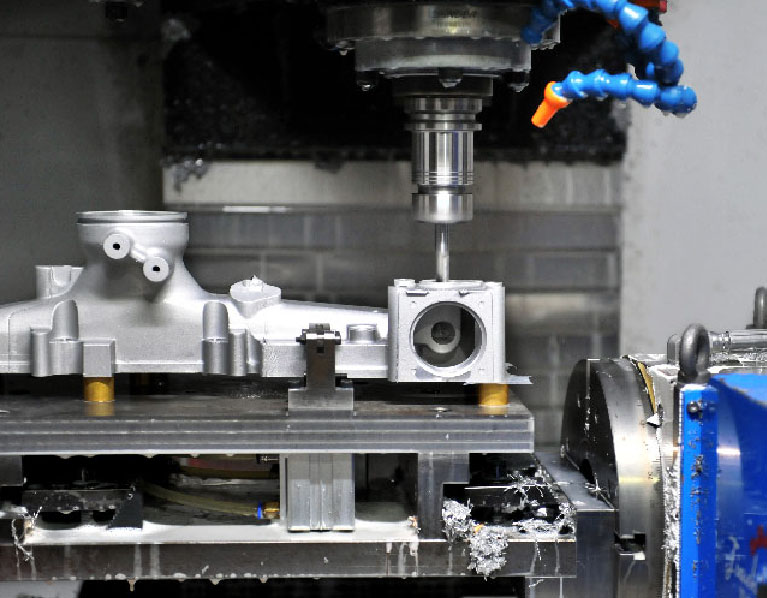CNC numerical control precision machining is a vital technology in modern manufacturing industry and is widely used in aerospace, automobile manufacturing, medical equipment and electronic products. By using computer-controlled machine tools for precision machining, CNC technology can achieve high-precision and high-efficiency production processes to meet the processing needs of complex parts. This article will explore the core advantages, application scenarios and future development trends of CNC numerical control precision machining.
Core Advantages
High precision:
The biggest advantage of CNC numerical control precision machining is its excellent machining accuracy. By precisely controlling the position and movement speed of the tool, CNC machine tools can process parts within the micron level of accuracy, ensuring that the size and shape of each part fully meet the design requirements.
High efficiency:
Traditional manual machining is not only time-consuming, but also prone to errors. CNC technology greatly improves production efficiency by automating the machining process. After programming once, CNC machine tools can run continuously, greatly reducing the time of manual intervention and increasing production speed.
Flexibility:
Another major advantage of CNC numerical control precision machining is its high flexibility. By changing tools and adjusting programs, CNC machine tools can quickly adapt to the processing needs of different parts without tedious manual adjustments, and are suitable for small batch and multi-variety production modes.
Consistency:
In large-scale production, the consistency of parts is crucial. CNC precision machining can ensure that the machining parameters of each part are completely consistent, avoiding quality fluctuations caused by human factors, thereby ensuring the consistency and stability of the product.

Application Scenarios
Aerospace:
In the aerospace industry, the machining accuracy and material strength requirements of parts are extremely high. CNC precision machining can meet the complex shapes and strict tolerance requirements of aerospace parts, and is an important technology for manufacturing key parts such as aircraft engines and fuselage structural parts.
Automobile manufacturing:
CNC technology is widely used in automobile manufacturing for the processing of high-precision parts such as engine parts, gearbox gears, and body molds. Through CNC machining, not only can the manufacturing accuracy of parts be improved, but also the production efficiency can be improved and the manufacturing cost can be reduced.
Medical devices:
Medical devices have very high requirements for the accuracy and surface quality of parts. CNC precision machining can produce complex parts that meet medical standards, such as implants, surgical instruments, etc., to ensure their accuracy and reliability.
Electronic products:
As electronic products develop towards miniaturization and high performance, the precision requirements for parts processing are also getting higher and higher. CNC precision machining can meet the processing needs of tiny parts in electronic products, such as mobile phone casings, micro connectors, etc.
Future Development Trends
Intelligence:
With the advancement of Industry 4.0, CNC precision machining is developing towards intelligence. By introducing the Internet of Things and artificial intelligence technologies, CNC machine tools will achieve autonomous decision-making and optimization, and improve processing efficiency and quality.
AI-driven inspection systems can detect defects and inconsistencies with greater accuracy than traditional methods. By integrating AI into quality control, manufacturers can ensure that every part meets the required specifications.
Artificial Intelligence (AI) and Machine Learning (ML) are becoming increasingly integrated into CNC machining processes. These technologies are transforming how machines operate, leading to significant improvements in efficiency and quality.
Multi-axis:
While 3-axis CNC machines have been standard for many years, the industry is moving towards more advanced multi-axis machining. 5-axis and even 7-axis CNC machines are becoming more common, offering enhanced capabilities for producing complex parts.
Multi-axis machines allow for the machining of intricate geometries without the need for multiple setups. This reduces the risk of errors and increases production efficiency.
The ability to machine parts from multiple angles in a single setup opens up new possibilities for producing complex components that were previously difficult or impossible to manufacture.
Advanced Materials And Tooling Innovations
The demand for advanced materials, such as composites, superalloys, and high-performance plastics, is growing across various industries. CNC precision machining is evolving to accommodate these materials, with new tooling technologies and machining strategies being developed.
Industries like aerospace and energy are increasingly using high-temperature alloys that are difficult to machine. Innovations in cutting tools, such as the use of advanced coatings and materials, are making it possible to machine these alloys with greater precision and efficiency.
As composites become more prevalent in industries like automotive and aerospace, CNC machining techniques are being adapted to handle the unique challenges of these materials, such as delamination and fiber pullout.
Sustainability And Eco-Friendly Manufacturing
Sustainability is becoming an increasingly important consideration in manufacturing, and CNC precision machining is no exception. Future developments will focus on reducing the environmental impact of machining processes.
Advances in machine design and control systems are leading to more energy-efficient CNC machines, reducing the carbon footprint of manufacturing operations.
Techniques such as near-net-shape machining and hybrid manufacturing help minimize material waste, contributing to more sustainable manufacturing practices.
The development of new methods for recycling and reusing machining by-products, such as metal chips and cutting fluids, will further enhance the sustainability of CNC machining processes.
Customization and On-Demand Manufacturing
As consumer preferences shift towards more personalized products, CNC precision machining is adapting to meet the demand for customization and on-demand manufacturing.
CNC machining enables the production of customized components at scale, allowing manufacturers to offer personalized products without sacrificing efficiency.
The ability to quickly set up and run small batches of customized parts makes CNC machining ideal for on-demand production, reducing the need for large inventories and enabling just-in-time manufacturing.
The rise of digital manufacturing platforms is making it easier for companies to access CNC machining services on demand, streamlining the process of ordering custom parts and reducing lead times.
Conclusion
As an important technology in modern manufacturing, CNC precision machining plays an irreplaceable role in various industries with its high precision, high efficiency, flexibility and consistency. With the development of intelligent, multi-axis and green manufacturing, CNC technology will further improve the overall level of manufacturing and make greater contributions to promoting industrial progress and economic development.



